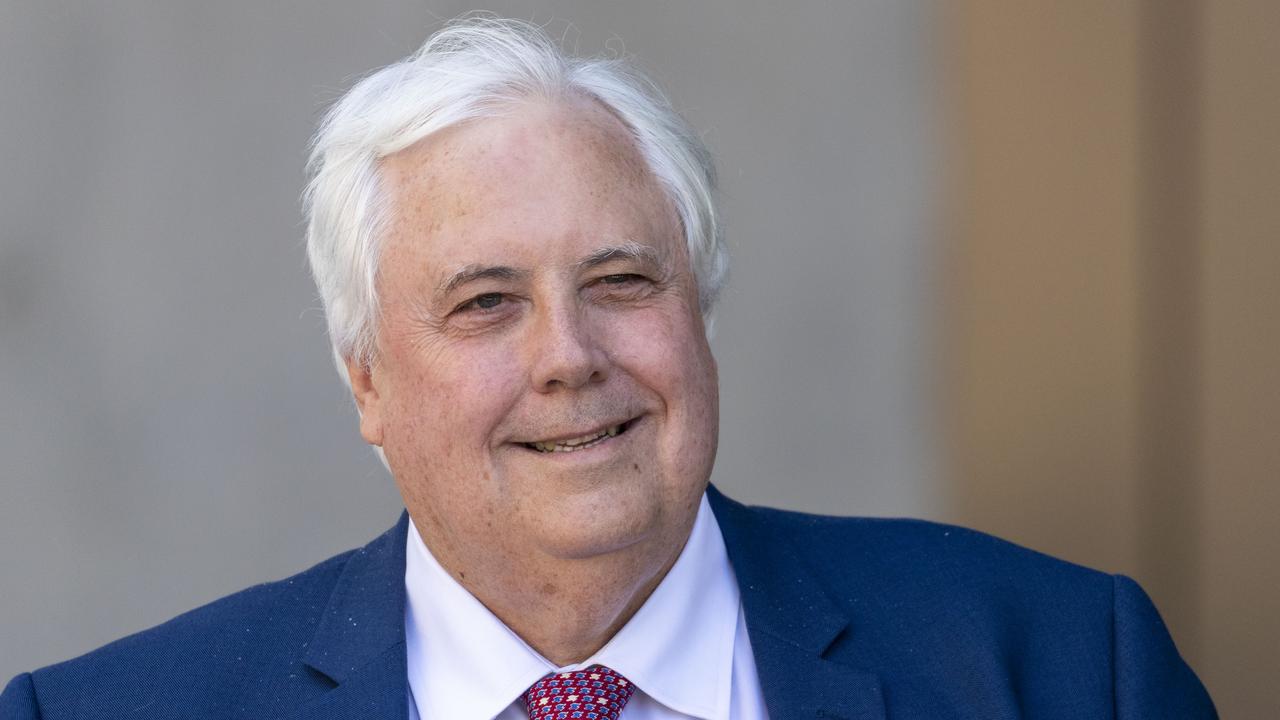Clive Palmer ‘invented sham document’ over $12m in Chinese funds
CLIVE Palmer invented a “sham” document to cover up his alleged misuse of $12 million in Chinese funds, a court has heard.

CLIVE Palmer invented a “sham” document to cover up his alleged dishonest funnelling of $12 million in Chinese funds into his political party and elsewhere, a court has heard.
Disgruntled Chinese business partners of Mr Palmer are suing him in the Queensland Supreme Court for dishonest and fraudulent breach of trust over the $12m.
The long-awaited civil trial before Justice David Jackson began today in a packed Brisbane courtroom.
In a fiery opening statement, barrister Andrew Bell SC — for Chinese government-owned conglomerate CITIC Pacific and Sino Iron — said the Palmer United Party leader would not front the court to explain the dishonesty allegations against him and other “gaping holes” in his story.
The case centres on the $12m, which was paid into a bank account by the Chinese to pay for administration of a Western Australian port connected to the two parties’ giant Sino Iron project in the Pilbara.
Mr Palmer is alleged to have not spent the money on port management, but on PUP, election advertising, paying an American Express credit card bill and other purposes unrelated to the port.
Mr Bell said the crucial piece of evidence against Mr Palmer was the “sham” document: a Port Management Services Agreement “dreamt up” by Mr Palmer and “backdated” to May 2012 to “justify” the unjustifiable payments.
It was from the creation of this document that Justice Jackson should draw “powerful inferences” of dishonesty against Mr Palmer, Mr Bell said.
Mr Palmer admitted two weeks ago the document — signed by him — was backdated and not drafted when it was originally purported to be. He has strenuously denied any wrongdoing. Mr Palmer is defending the lawsuit, represented by barrister Simon Couper QC.
The Australian reported this week that West Australian police have launched a preliminary fraud investigation into the matter.
The case is complex, and centres around the allegation by the Chinese that the payments (totalling just over $12m) by Mr Palmer or his company, Mineralogy, were a “breach of trust”. The CITIC conglomerate want Justice Jackson to agree, and order Mr Palmer and his companies to pay compensation.
Justice Jackson must first decide whether the bank account from which the $12m was paid into by the Chinese and withdrawn from by Mr Palmer was a trust.
The Chinese say it was, Mr Palmer says it wasn’t.
The PUP leader argues that because it not a trust, he and his companies were entitled to use the cash in whatever way they wanted.
Mr Couper QC made several “concessions” on behalf of his client, before Mr Bell began his opening statement.
“We concede that if it is a trust, and if Mr Palmer had knowledge of the trust, and there was a breach, then the Plaintiffs (the Chinese conglomerate) do not need to prove either that (Mr Palmer’s company) Mineralogy’s breach of trust was fraudulent or dishonest,” Mr Couper said.
“And the Plaintiffs do not need to prove that Mr Palmer in procuring the breach of trust acted fraudulently or dishonestly, in order to obtain the relief they seek.”
Mr Couper said the “consequence” of the concessions was that CITIC no longer needed to prove fraud or dishonesty against Mr Palmer or Mineralogy in order to achieve their end objective, a “breach of trust’’ declaration and compensation.
“...The question of fraud and dishonesty, either by Mineralogy as trustee or by Mr Palmer, has no relevance,” Mr Couper said.
“The only issues which remain alive in the proceedings are one, was there a trust? Two, did Mr Palmer ... know there was a trust?”
Mr Couper flagged objecting to much of the evidence led about alleged dishonesty by Mr Palmer, in light of the concessions.
The trial continues.



